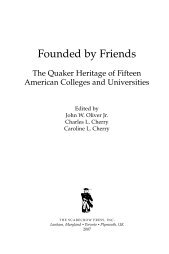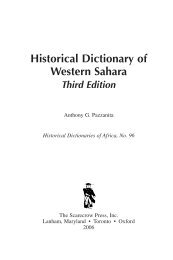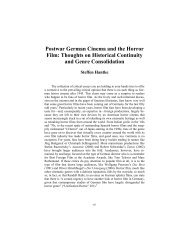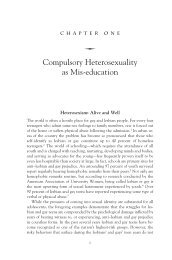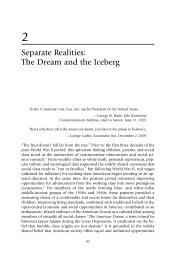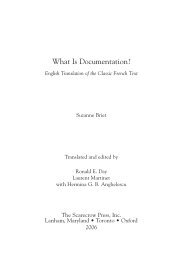Historical Dictionary of the Gypsies (Romanies) - Scarecrow Press
Historical Dictionary of the Gypsies (Romanies) - Scarecrow Press
Historical Dictionary of the Gypsies (Romanies) - Scarecrow Press
You also want an ePaper? Increase the reach of your titles
YUMPU automatically turns print PDFs into web optimized ePapers that Google loves.
INTRODUCTION • xxxix<br />
duced similar legislation 10 years later, and o<strong>the</strong>r countries soon followed.<br />
The punishment for remaining was <strong>of</strong>ten death. There was some<br />
migration to Poland, mirroring that <strong>of</strong> <strong>the</strong> Jews. The policy <strong>of</strong> expulsion<br />
failed in most cases, however, as <strong>the</strong> countries to which <strong>the</strong>y were deported<br />
<strong>of</strong>ten returned <strong>the</strong>m quietly over <strong>the</strong> borders. Only <strong>the</strong> Scandinavian<br />
countries and <strong>the</strong> Ne<strong>the</strong>rlands managed to efface all visible trace<br />
<strong>of</strong> <strong>Gypsies</strong> for over two centuries. Most governments finally had to try<br />
a new policy—enforced integration or assimilation.<br />
In Spain in 1499 and in Hungary in 1758, new laws required <strong>Gypsies</strong><br />
to settle down or leave <strong>the</strong> country. They had to become land<br />
workers or be apprenticed to learn a craft. But <strong>the</strong>y also had to be assimilated<br />
into <strong>the</strong> native population. Everywhere laws forbade <strong>Gypsies</strong><br />
to wear <strong>the</strong>ir distinctive colorful clo<strong>the</strong>s, to speak <strong>the</strong>ir language,<br />
to marry o<strong>the</strong>r <strong>Gypsies</strong>, or to ply <strong>the</strong>ir traditional trades. As a result<br />
<strong>of</strong> <strong>the</strong>se policies, today large populations <strong>of</strong> long-settled <strong>Gypsies</strong> can<br />
be found in Spain and Hungary, while in Romania Gypsy land workers<br />
and craftspeople were reduced to a status below that <strong>of</strong> serfs, to<br />
virtual slavery.<br />
The latter part <strong>of</strong> <strong>the</strong> 19th century saw a new migration westward as<br />
Romania released its <strong>Gypsies</strong> from bondage. Many thousands emigrated,<br />
some as far as America, Australia, or South Africa. Well over a<br />
million <strong>Gypsies</strong> live in North and South America today, with <strong>the</strong><br />
Kalderash clan forming <strong>the</strong> majority.<br />
The nomadic <strong>Gypsies</strong>, however, have survived as a distinctive group<br />
until <strong>the</strong> present day. The reason for this was partly <strong>the</strong> inefficiency <strong>of</strong><br />
local constabularies but also that <strong>the</strong> <strong>Gypsies</strong> developed as a fine art <strong>the</strong><br />
practice <strong>of</strong> living on <strong>the</strong> border <strong>of</strong> two countries or districts and slipping<br />
over <strong>the</strong> border when <strong>the</strong> forces <strong>of</strong> law and order approached. Also, <strong>the</strong><br />
nobility and large landowners throughout Europe protected <strong>the</strong> <strong>Gypsies</strong>.<br />
They encouraged seminomadic families to stay on <strong>the</strong>ir land and were<br />
able to employ <strong>the</strong> men as seasonal laborers. The women could serve in<br />
<strong>the</strong> house or sing and dance when guests came.<br />
In <strong>the</strong> 19th and 20th centuries in western Europe, <strong>Gypsies</strong> encountered<br />
problems finding stopping places. Camping on <strong>the</strong> side <strong>of</strong> <strong>the</strong><br />
main roads was made difficult by laws such as <strong>the</strong> UK Highways Act <strong>of</strong><br />
1835. Large shantytown settlements developed on wasteland, but <strong>the</strong>n<br />
<strong>the</strong> authorities stepped in and evicted <strong>the</strong> families. Such incidents occurred<br />
in England, starting with <strong>the</strong> Epping Forest eviction <strong>of</strong> 1894 and





